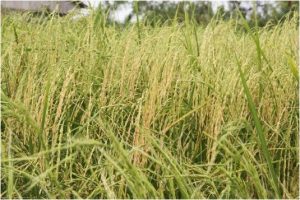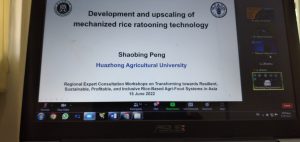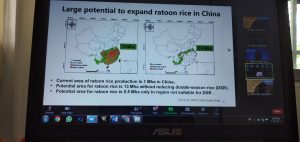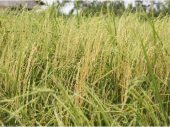Workshop (Virtually)on Regional Consultation on Transforming towards Resilient, Sustainable, Profitable, and Inclusive Rice-Based Agri-Food Systems in Asia
Co-Organizers: Huazhong Agricultural University, FAO’s Regional Office for Asia and the Pacific
 Rice ratooning is not a new practice for farmers. It has been successfully adopted in many countries, including China, India, Japan, Philippines, Thailand, Iran, Brazil, and Colombia. However, the adoption of traditional ratoon rice with the first crop harvested manually has been limited due to labor shortages as well as low and unstable grain yield in ratoon crops. The challenge, therefore, is to develop rice ratooning technology with the main crop harvested mechanically for the sustainable development of ratoon rice.
Rice ratooning is not a new practice for farmers. It has been successfully adopted in many countries, including China, India, Japan, Philippines, Thailand, Iran, Brazil, and Colombia. However, the adoption of traditional ratoon rice with the first crop harvested manually has been limited due to labor shortages as well as low and unstable grain yield in ratoon crops. The challenge, therefore, is to develop rice ratooning technology with the main crop harvested mechanically for the sustainable development of ratoon rice.
 To this, the Food and Agriculture Organization of the United Nations (FAO) has set a virtual regional consultation on transforming toward resilient, sustainable, profitable, and inclusive rice-based Agri-food systems in Asia. This online event will take place on June 15, 2022. This virtual workshop was held in collaboration with the Huazhong University of Agriculture and FAOs Regional Office for Asia and the Pacific. The main theme of the workshop was scaling up the ratoon rice, an alternative resilient, profitable, and sustainable rice farming system to accelerate the rice-based Agri-food systems transformation. The workshop was attended by researchers from FAO, China, Bangladesh, Nepal, Iran, Pakistan, Sri Lanka, Iran, and some leading countries in this field.
To this, the Food and Agriculture Organization of the United Nations (FAO) has set a virtual regional consultation on transforming toward resilient, sustainable, profitable, and inclusive rice-based Agri-food systems in Asia. This online event will take place on June 15, 2022. This virtual workshop was held in collaboration with the Huazhong University of Agriculture and FAOs Regional Office for Asia and the Pacific. The main theme of the workshop was scaling up the ratoon rice, an alternative resilient, profitable, and sustainable rice farming system to accelerate the rice-based Agri-food systems transformation. The workshop was attended by researchers from FAO, China, Bangladesh, Nepal, Iran, Pakistan, Sri Lanka, Iran, and some leading countries in this field.
 At the beginning of the workshop, Dr. Zhaohu Li, President of Huazhong Agricultural University of China, and Dr. Shaobing Peng, ratoon rice senior researcher, described their intensive activities in ratoon cultivation over the past years. In this workshop, they pointed out the challenges facing the rice main crop-ratoon cultivation system and the solutions to overcome them. According to them, China has achieved great success in recent years in terms of expanding the cultivation area, technology, and therefore the yield of ratoon rice. The workshop focused on the development of new technologies in the rice-ratoon system, as well as case studies in China.
At the beginning of the workshop, Dr. Zhaohu Li, President of Huazhong Agricultural University of China, and Dr. Shaobing Peng, ratoon rice senior researcher, described their intensive activities in ratoon cultivation over the past years. In this workshop, they pointed out the challenges facing the rice main crop-ratoon cultivation system and the solutions to overcome them. According to them, China has achieved great success in recent years in terms of expanding the cultivation area, technology, and therefore the yield of ratoon rice. The workshop focused on the development of new technologies in the rice-ratoon system, as well as case studies in China.
 Invited researchers from other leading countries spoke about the conditions of rice-based cropping systems, especially rice-ratoon, as well as the challenges and opportunities ahead. At the end of the workshop, the researchers emphasized more communication and cooperation in this field in order to expand rice-based agricultural food systems, especially ratoon cultivation, in the participating countries, especially in South and Southeast Asia.
Invited researchers from other leading countries spoke about the conditions of rice-based cropping systems, especially rice-ratoon, as well as the challenges and opportunities ahead. At the end of the workshop, the researchers emphasized more communication and cooperation in this field in order to expand rice-based agricultural food systems, especially ratoon cultivation, in the participating countries, especially in South and Southeast Asia.
In this workshop, Dr. Farzin Pouramir, an academic member of the Rice Research Institute of Iran (RRII), and Ms. Alipour, from the Ministry of Jihad Agriculture (Rice office), explained the situation of ratoon in Iran and the challenges it faces.

